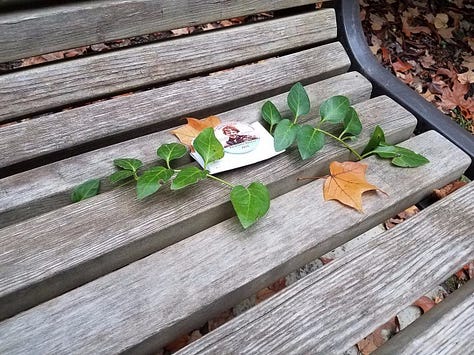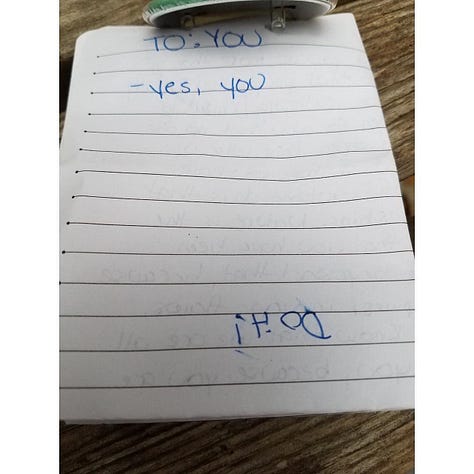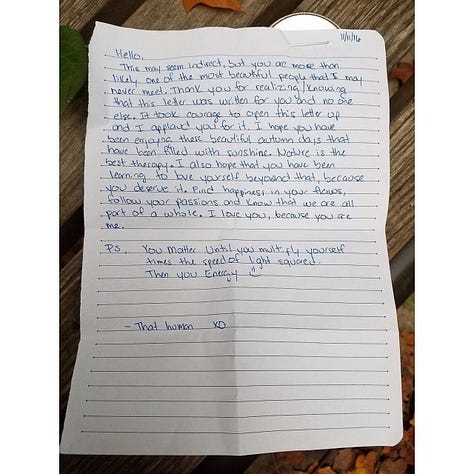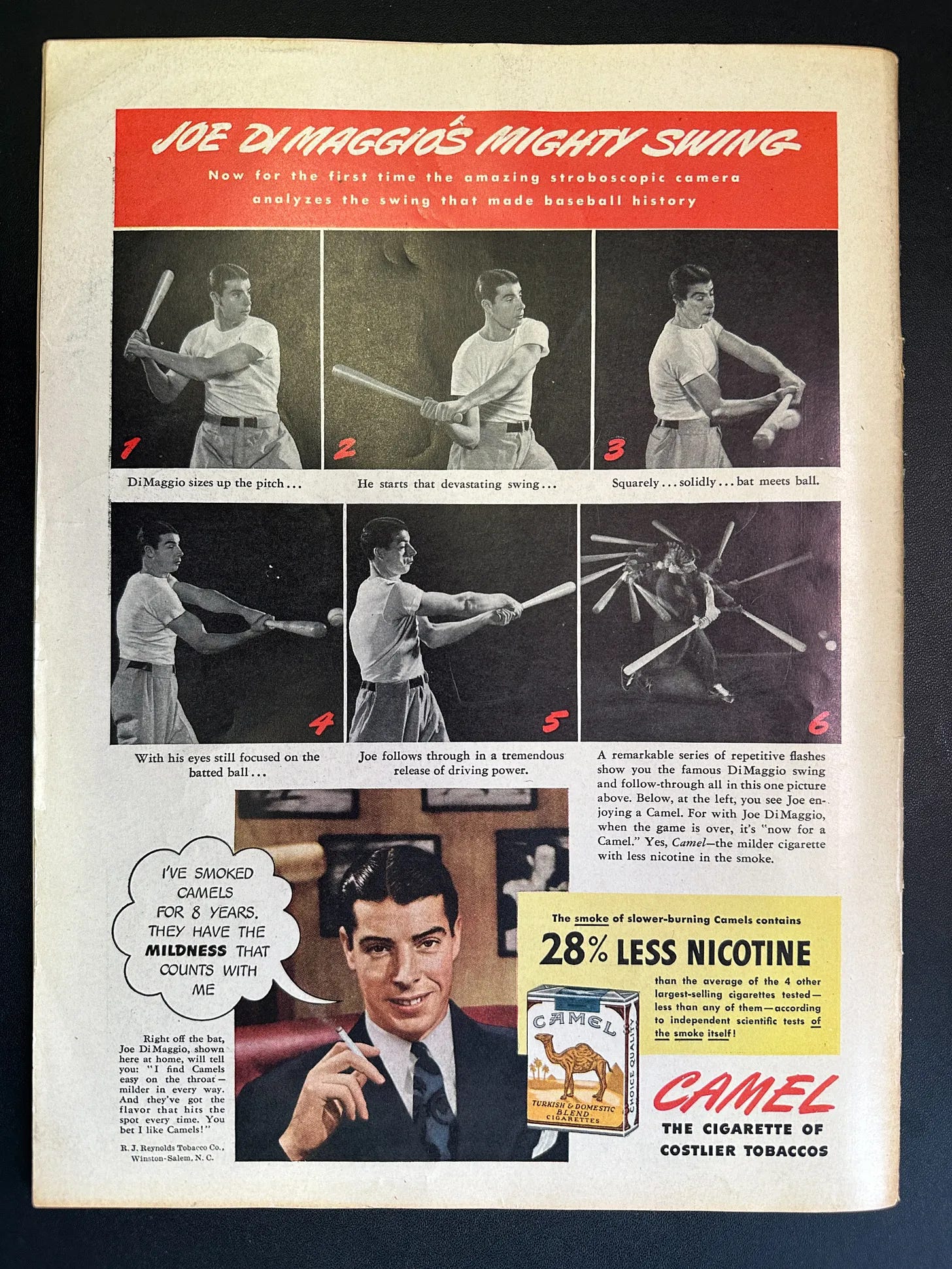ASHLAND, Ore., 2016 — Last fall I wrote about newly-resonant songs from my writing playlist. No sooner had I sent that newsletter than I started thinking about the end of 2016, the beginning of 2017, and another playlist I put together then.
One weekend that November, I found myself caught in a strange emotional duality during a trip to Ashland, Oregon. On one hand, I was excited. I was driving to Ashland for a reading of my debut book, Eve of a Hundred Midnights, at Bloomsbury Books. After years spent working on this project, the high of traveling to share it felt exhilarating. On the other hand, Donald Trump had just won the presidency. Like the rest of the world, I was shaken by the election and still coming to terms with Trump’s victory.
My girlfriend, Andrea (now my wife) and our dog, Noah (who recently celebrated his fourteenth birthday), joined me for the hours-long drive. We’d been dating (my wife and I, not the dog and I) for about a year but were still getting to know one another in many ways. One of those: sharing our favorite road trip music.
After we hit the road a playlist I’d started putting together before the trip quickly became collaborative. Mile after mile, hour after hour, Andrea and I took turns adding various songs we wanted the other to hear. We spent the entire drive swapping favorites with one another.
Between each song we discussed our choices and told stories about how they fit in our lives. We remarked on those many places where our tastes aligned. We playfully debated the rare tune where our opinions differed. We shared where we’d been when we’d first heard the songs we shared, recounted the experiences of ours they’d accompanied, described the people we’d first heard them with or who’d been on our minds when we discovered them, and explained why these songs still moved us long after our lives had evolved past these moments we described. All the while, we glimpsed new facets of one another’s personalities while se shared these treasured musical gems.
Then
Toward the end of the drive, we each independently suggested songs by Leonard Cohen. Both of us are better writers than we are musicians, so we were most struck by Cohen’s lyricism. But that afternoon something deeper than his lyrics seemed to draw us to his work. Neither of us quite knew how to express what Famous Blue Raincoat, Suzanne, and So Long, Marianne were making us feel, though we each simply knew the other understood.
We only recognized the significance of that moment after we’d arrived in Ashland. As we walked from our hotel to my event that night, I happened to look at my phone at a crossing signal. Then I saw the headline: Cohen was dead.
I was too stunned to move. At first I couldn’t answer Andrea when, realizing I hadn’t crossed the street, she turned around to see what was wrong. Finally I stammered out what had happened and she too fell silent.
Maybe we shouldn’t have been surprised. We knew Cohen was in his eighties, but more importantly, we’d both seen reports of Cohen’s illness. During our drive we’d even discussed the stories we’d each seen of his failing health. Still, the news gutterd us as if we’d known Cohen personally. We felt as shocked as we might have had a dear relative perished immediately after we’d just visited them. Perhaps it had something to do with the uncertainty of that moment we’d suddenly plunged into just a week or so prior, perhaps especially because it had started to seem like we were finally finding our footing after that first moment of foreboding uncertainty.
Though Cohen’s death had nothing to do with the recent election, learning of it amplified pain we already felt. You Want It Darker, Cohen had challenged listeners with his final album. Did we?
Suddenly the world did, indeed, seem measurably darker. I remember few details of my reading in Ashland, but I do recall that it went well. Andrea and I were even able to postpone our mourning for Cohen — and for the world that had been — until we were back at our hotel. Once there, we couldn’t ignore any of it any longer. So we did the only thing that we could imagine. We put on Cohen’s music and listened for what seemed like hours.
We were mostly quiet, I think. We listened and danced and just were. Cohen’s music moved us, connected us, and bonded us in a moment when so much felt unstable, uncertain, and scary. It was intimate, strange, and emotional. As dark as everything was, existence also felt in that moment incredibly, relievingly close.
The next morning we walked through Downtown Ashland from our hotel to Lithia Park. Ashland may be a tiny southern Oregon college town — albeit one with a world-renowned Shakespeare festival — but Lithia Park punches above its weight. Indeed, I believe it’s among the greatest municipal parks in the world. It’s difficult to explain exactly why, but Lithia entrances me every time I visit, and I think I can confidently write that Andrea feels similarly.
We needed that kind of magic that morning. Simply stepping foot in Lithia park soothed us. We felt like we belonged right there, right then. But there was more to the magic that day than the park itself.
After winding through the park’s pathways we reached a wide, empty clearing. There was one park bench directly across the grassy field from where we stood. The field was still a bit dewy and immaculate. That is, immaculate except for a neatly folded packet of paper on the bench.
I saw it immediately and instantly knew it wasn’t just random litter. The paper was an invitation to itself, to whatever message was contained within its careful folds.
Years ago, I’d been a devotee of Found Magazine. This, I realized, was a Found moment, if ever there was one. I approached the bench, picked up the paper, and did as it insisted.



I opened the note. It read as follows:
11/11/16
Hello,
This may seem indirect, but you are more than likely one of the most beautiful people that I may never meet. Thank you for realizing/knowing that this letter was written for you and no one else. It took courage to open this letter up and I applaud you for it. I hope you have been enjoying these beautiful autumn days that have been filled with sunshine. Nature is the best therapy. I also hope that you have been learning to love yourself beyond that, because you deserve it. Find happiness in your flaws, follow your passions and know that we are all part of a whole. I love you, because you are me.
PS, You matter. Until you multiply yourself times the speed of light squared. Then you Energy =)
-That human XO
I’m mostly not a superstitious person — I’m definitely not religious — but the discovery seemed fated. Obviously it was intended for someone like me, a stranger curious enough to pick it up and read it. I’ve always wondered who left it. There was contact info but I never reached the note’s author. In fact, until I pulled these pictures back up for this post I’d forgotten there was contact information right there on that button, and I’ve spent the past eight years imagining why the note was written and left there.
What I came to suspect was that whoever had written the note had been in a mood similar to mine that week. Reaching out to some stranger by writing an encouraging note was how “That Human” coped with the week’s unsettling news. Maybe writing the note was an indirect attempt to forge community by reminding someone the author “might never meet” that nature is therapeutic, that we all deserve love, and that we are all “a part of a whole.” If so, I often regret not doing enough on my part to reach the author and nurture community with them directly. On the other hand, it was written with full awareness that they might never meet me and still, they love me, and us, and you, just as much. Regardless of why that note was written or left on that bench in that park in that city at that time, I welcomed its existence. I still welcome it.
As I wrote about this I was still thinking about the interplay of my writing and music and I thought of words from yet one more musician — one who’d also die within a year of that discovery in Ashland — whose music has been present in much of my life. That musician was Tom Petty. His album Wildflowers in particular has long and frequently accompanied my writing.
And the days went by like paper in the wind
Everything changed, then changed again
-Tom Petty, “To Find a Friend”
I don’t really know what any of this means, or if it even needs to mean anything. It feels like entire lifetimes — entire eternities even — have passed in the eight years since November, 2016, when Trump first won office, Leonard Cohen died, and I visited Ashland and found that note. Privately and publicly, the world changed, and then changed again. Still, though we may think of the similarities between the elections of 2016 and 2024, another throughline connects then and now. That throughline gives me hope: No matter how dark we may find the world, we are not alone in its shadows.
What spontaneous finds have you made that give you hope? How are you finding joy and community in this dismal moment? Let me know in the comments, or however you prefer.
This Week’s Souvenir: Joe DiMaggio’s Mighty Swing
This fall I was perusing some old issues of LIFE Magazine and couldn’t help but notice this ad featuring the famed New York Yankees slugger Joe Dimaggio.
Joltin’ Joe may have found Camels “easier on the throat,” but knowing now that he died of lung cancer, one wonders if “the flavor that hits the spot every time” was worth it for Dimaggio.
Today it’s old news how wildly deceptive cigarette ads once were about the dangers of smoking. As someone whose work frequently involves perusing early 20th Century periodicals I constantly encounter material in print that would never be proposed, let alone approved, today. None of it should surprise me but I’m still regularly fascinated by what I find. If you want to see more please subscribe!
This Week’s Scenery

To return to darkness for a moment, as I noted this morning, today marks the anniversary of the LAPD’s 1936 “Bum Blockade,” during which squads of armed police offers fanned out from Los Angeles to sixteen checkpoints along California’s state lines with a mission to keep Dust Bowl Refugees and other poor domestic migrants from entering the Golden State. I wrote about that operation in my 2022 book, The Golden Fortress: California’s Border War on Dust Bowl Refugees. I also marked its anniversary in an early edition of this newsletter two years ago. Sadly, as I noted in the book:
“Historical hindsight might treat [Los Angeles Police Chief James E.] Davis's border blockade as a curious blip. Perhaps they'd dismiss it as all bluster with little impact, but the deployment operationalized anti-migrant attitudes that had long pervaded California's ruling institutions…and made tangible a generation
of reactionary politics in the Golden State.”
This troubling chapter in U.S. history remains ever so relevant today. The past is present.
Dogtopia: Strolling in Ashland

More soon!
No detours just now. I have two somethings-else cooking, at least one of which I’ll send later this week with the usual features. If you like what you’re reading please say so in the comments, on social media, or elsewhere, and definitely share it!
Also, if you’d like to support me, paid subscriptions are active. I’m working on perks, etc. But life is life and I know too well to promise anything on these pixels just yet, so no complaints if you don’t want to pay just yet.
But I promise you this: I love you. Yes. You.





Hi Bill, thank you for this. It's so beautiful. I've been thinking of You Want It Darker recently too. And I was a hardcore FOUND! magazine fan. The idea of seeking or offering messages and connections among our fellow bipedal animals is potent. Resist. Through love. ❤️